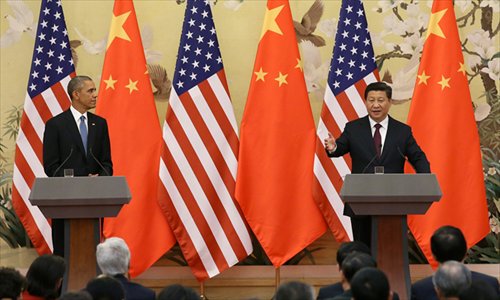

Chinese President Xi Jinping speaks at a joint press conference alongside US President Barack Obama at the Great Hall of the People in Beijing on Wednesday. Photo: Xinhua
China's vow that its carbon emissions will reach a peak around 2030, announced following a summit between President Xi Jinping and his US counterpart Barack Obama on Wednesday, is expected to propel the country's economic and industrial transformation. [Special coverage]
According to a joint statement on climate change issued following the Xi-Obama meeting, China also plans to increase the share of non-fossil fuels in primary energy consumption to around 20 percent by 2030.
In the meantime, the US plans to slash its "economy-wide" emissions by 26-28 percent below 2005 levels by 2025.
Both countries pledged to strive to reach the goals ahead of schedule.
Climate scientists said Wednesday that the goals are not overly ambitious for either country given their current plans, policies and laws, but said the agreement would inject momentum into global climate negotiations and contribute to the adoption of a new pact at the UN Climate Conference in Paris in 2015.
Countries were expected to submit their post-2020 climate "contributions" by the first quarter of 2015. With the statement, the two largest emitters in the world have made a genuine commitment by announcing their goals ahead of time, thus laying a solid foundation for tackling obstacles in upcoming climate talks, Wang Tao, a climate scholar at the Carnegie-Tsinghua Center for Global Policy, told the Global Times.
Andrew Steer, President and CEO of Washington-based environmental group World Resources Institute, hailed the joint statement as it shows a "heartening" level of cooperation between the two countries.
The compliment pinpointed a highlight of the meeting between Xi and Obama, as Xi reiterated the principles underlying the "new type of major power relations" the two sides have sought: no conflict, no confrontation, mutual respect, cooperation and common prosperity.
Cooperation in dealing with new threats, including climate change that threatens many countries in many different ways, is a significant point in deepening this new type of relationship, Zhao Minghao, a scholar with the Charhar Institute, an independent think tank, was quoted as saying by thepaper.cn.
The emissions reduction targets are in line with China's plans for economic and industrial restructuring, but concerns remain that they might drag down China's GDP after signs of slowing growth this year.
Wang said it is crucial but difficult to guide local governments through the transition to a low-carbon economy given their financial burdens, particularly local debts. However, he said the statement sends a positive policy signal that China is determined to regulate economic development, and realize balanced urbanization.
China has made a realistic commitment and could even reach its goal around 2025, as the country's coal consumption is likely to peak by 2020, which could mark a turning point in carbon emissions, Lin Boqiang, a professor with the China Center for Energy Economics Research at Xiamen University, told the Global Times.
The goal is in line with China's determination to control air pollution, which could affect economic growth in the short term, but has deep support as a policy choice necessary to help bring about sustainable development, said Lin.
Other experts have said that it is a myth that pollution control will harm the economy. In a recent report issued by the Development Research Center of the State Council, China's economic restructuring reached a turning point last year when the service sector's actual growth rate surpassed the energy-hungry manufacturing sector.
The country's decision to promote eco-friendly policies should also open the way to a number of new growth opportunities, making possible new forms of development for less developed regions with ample clean energy generating potential, said the report.
Agreements to cooperate with the US in clean energy, low carbon cities and environmental protection will give China the opportunity to acquire and develop cutting-edge technologies and act as a leader in pushing forward a global transition to clean energy, said analysts.
Despite broad agreement on climate change, China and the US still remain divided over an array of other issues. But during their meeting, Xi and Obama played down the disputes and emphasized that the two countries will strive to manage any differences.
In boosting military ties, the two countries signed Memorandums of Understanding on establishing a mutual reporting mechanism on major military operations and a code of safe conduct on naval and air military encounters.
They also agreed to speed up efforts to reach consensus on core issues and major clauses of a bilateral investment treaty by the end of 2014, and begin negotiations next year on a "negative list," a measure which could greatly expand the number of sectors open to investment in each country.
Xi said that China and the US should and will be able to cooperate in more areas, with Obama reaffirming that the US welcomes a peaceful, prosperous and stable China.
Copyright ©1999-2018
Chinanews.com. All rights reserved.
Reproduction in whole or in part without permission is prohibited.